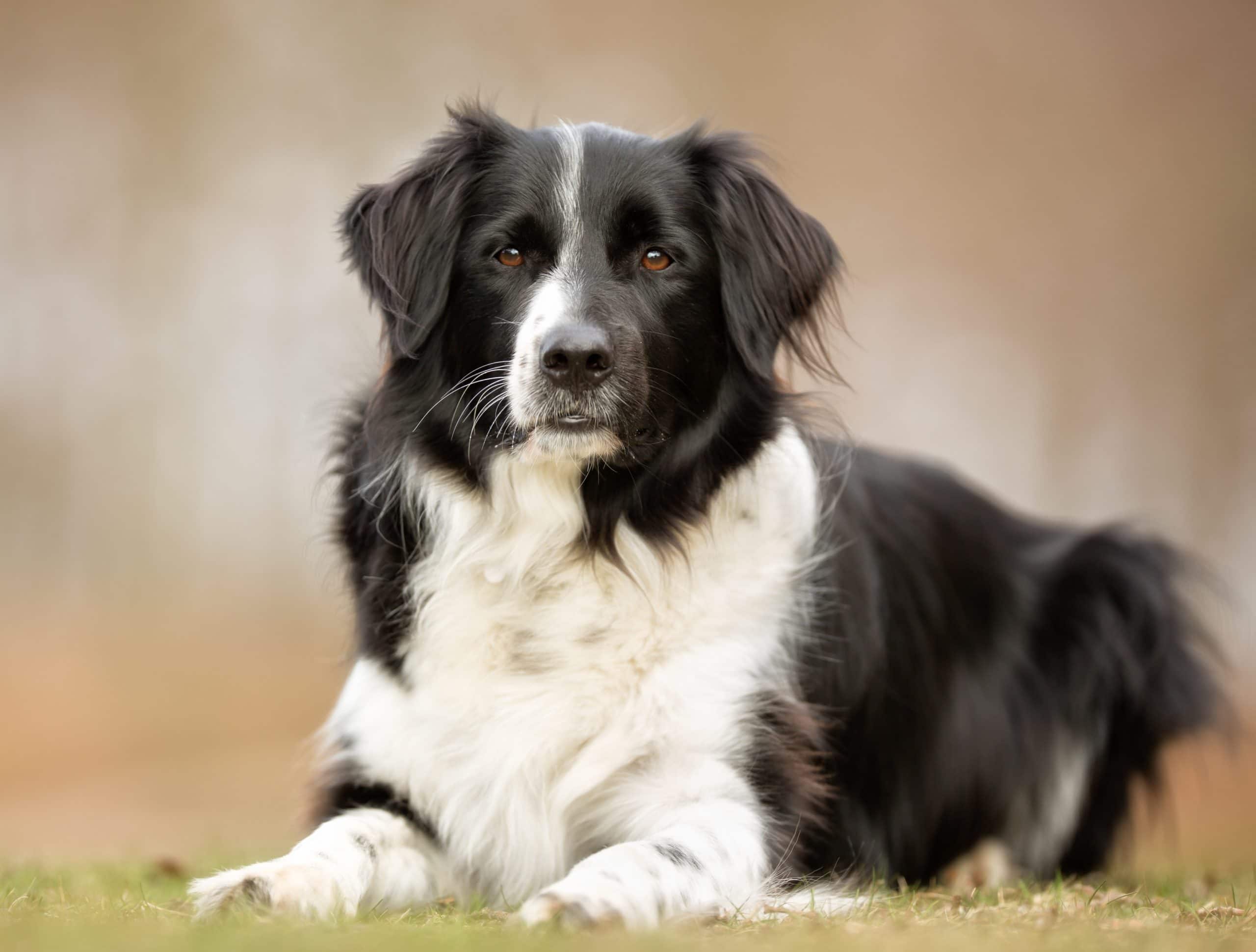
Click Below to Skip Ahead
Border Collies are a herding breed from the Anglo-Scottish border region, hence their name. They were bred specifically to herd sheep, though they can be used for a wide variety of tasks. Their high intelligence allows them to learn quickly. It also means that they thrive most when given a job to do, making them a bit of a handful for the average family.
Breed Overview
Height:
18 – 22 inches
Weight:
27 – 45 pounds
Lifespan:
10 – 17 years
Colors:
Black, white, blue, red merle, lilac, chocolate, liver, brindle, gold
Suitable for:
Active families with older children, those involved in canine sports
Temperament:
Intense, active, devoted
They are energetic and require a great deal of exercise. These dogs can run for miles a day and handle difficult flocks. They frequently compete in just about any dog sport. They continue to be one of the most popular herding dogs in the world and increasingly popular companion animals.
Border Collie Characteristics
Border Collie Puppies
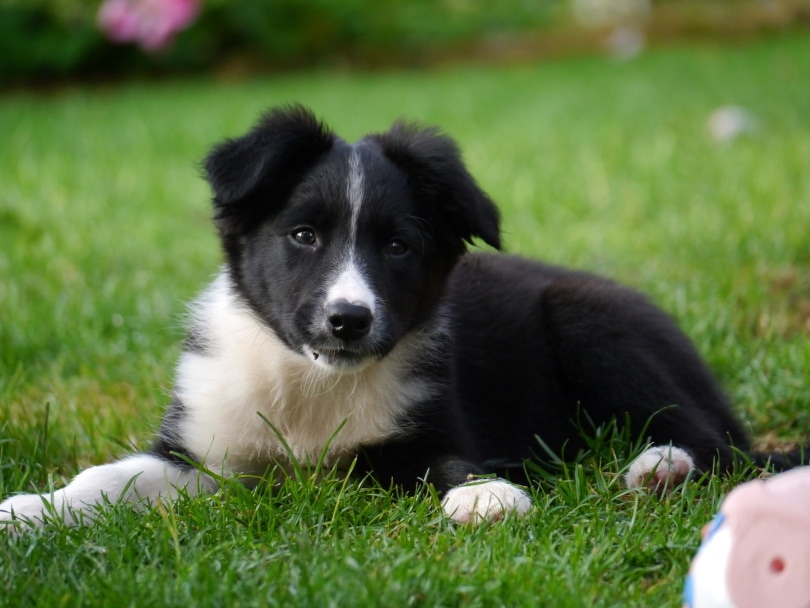
While Border Collies are a popular dog breed, they are quite expensive. Because they are larger dogs, they do require more room and food, which adds to their price. When you’re adopting a puppy, you’re paying for the cost of breeding and raising the puppies. This is why larger dogs are often more expensive.
You also have to take into account the cost of all the things that you need to properly take care of them. Because they are bigger dogs, they require more food and larger items than other dogs. This can be pricey, so be sure to budget for it. Large dog beds can be surprisingly expensive.
Temperament & Intelligence of the Border Collie
The Border Collie is often considered the most intelligent breed of dog. While this means you can train them to do many things, it also means that they need a great deal of mental stimulation. Often, they get this need met when utilized as herding dogs because they are working regularly. As companion animals, they must get their mental exercise needs met in some other way. This can be done through obedience training, puzzle toys, and canine sports. Plan to spend hours a day entertaining these dogs. Otherwise, they will become destructive in an attempt to make their own fun.
Because they were bred as working dogs, the Border Collie is extremely energetic. They can learn to behave in a house, but their exercise needs must be met first. Otherwise, they can knock people over and cause a mess of things. They are also quite playful and enjoy regular playtime in a fenced-in area. However, they tend to have more energy than their owners, so we recommend spending time figuring out how to meet their needs without getting worn out yourself.
They are quite intelligent, so they enjoy games of all sorts. Hide-and-seek and similar games are great options for this breed, as these wear out their mind and body at the same time.
These dogs are infamous for their destructive capabilities. They are prone to digging, chewing through walls, and eating furniture. However, this is largely because they have high physical and mental stimulation needs, not because the breed is just destructive. If all their needs are met, this typically isn’t a problem. It is essential to ensure that you can meet this dog’s needs before adopting them. Otherwise, you may find yourself with a bored and destructive dog.
These dogs have an extremely strong desire to herd. While they are used to herd livestock, they don’t always separate livestock from other moving objects in their mind. They may try to herd cats, other dogs, and even children. Many Border Collies get hit by cars because they attempt to herd them. Training can somewhat curb this issue, but it won’t go away completely. You will need to ensure that your dog is safe and not harassing other animals.
The biggest problem with this canine is that owners simply don’t know what they’re getting into when they adopt one. A working collie can run miles a day and work with chaotic livestock. Companion animals are built for a similar experience, even if they’ve never been on a farm. You must provide them with congruent exercise for them to be happy and healthy.
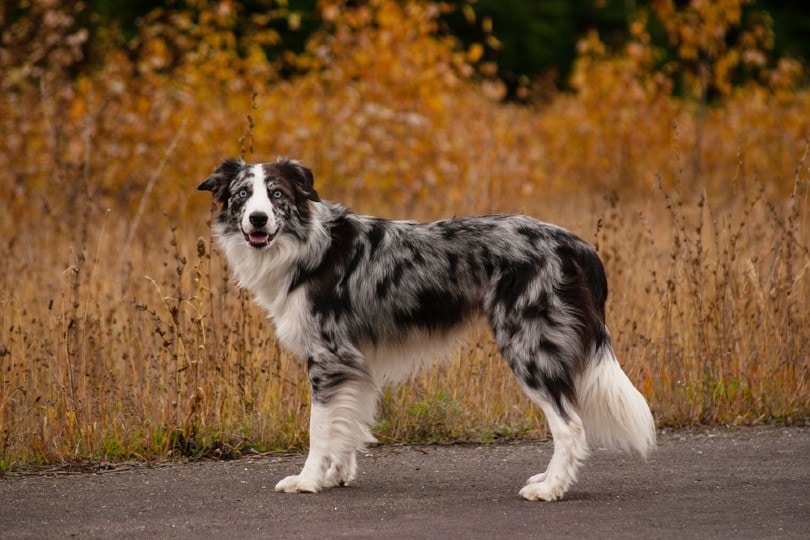
Are These Dogs Good for Families? 👪
We can recommend this dog for families with older children. They aren’t necessarily bad with younger children, but their herding instincts may cause them to “herd” younger children. When the child doesn’t respond like a sheep, the dog may up their tactics and begin nipping. This can be scary for the child, which often causes them to run, only causing the dog to chase them.
You can teach young children not to run from the dog. Instead, if they stand still and raise their arms in the air, the dog will often stop. However, this can be hard for toddlers to remember and difficult for parents to manage. For this reason, we do not generally recommend them for homes with smaller kids.
Older children typically don’t have a problem remembering this and managing the dog. Plus, Border Collies are less likely to herd larger children and adults. Small children tend to be a bit more hyper and run around, which sets off the dog’s herding instincts.
Does This Breed Get Along With Other Pets?
They are typically friendly to dogs that are about their size or larger. The problem mostly arises with little dogs, which they may attempt to herd. They aren’t aggressive, but most smaller dogs are not going to like being herded, which can lead to fights. It isn’t uncommon for smaller dogs to feel threatened by Border Collies, especially when the larger dog is nipping and staring at the smaller dog.
Socialization at an early age can help curb this behavior. If the Border Collie is often around other dogs, they may learn that they are not meant for herding. However, this isn’t always the case, so we don’t recommend them for homes where getting along with small dogs is absolutely necessary. You may end up with a Border Collie that doesn’t try to herd small dogs, or you may end up with one that does.
As you might imagine, their herding instincts carry over to cats and similar animals as well. They aren’t typically aggressive toward cats, like attempting to hunt them or anything. However, it isn’t uncommon for them to chase cats and try to herd them, which often isn’t appreciated by the cat. Socialization may help this, but it also might not.

Things to Know When Owning a Border Collie
Food & Diet Requirements 🦴
The Border Collie is an active dog, so they often have high exercise needs. They do best on a high-protein, high-meat formula. Look for foods that include high levels of whole meat and meat meal, which is simply dehydrated meat. Whole grains and veggies can be nutritious in small amounts. Dogs do not need much of them, though. Some companies may attempt to use these less-expensive items as fillers to bulk up their foods.
You should always provide fresh water for this breed. You will likely need to fill up their water often due to their high activity level. A lack of water can cause all sorts of health problems and stress the dog out, which can cause destructive behaviors.
If not exercised properly, the Border Collie is prone to becoming overweight. Because they require so much exercise, it is easy not to meet their daily activity needs. We recommend keeping a close eye on their body condition, as excess weight can cause issues.
Border Collies are medium-sized dogs. They don’t necessarily need a food fit for their specific size, but be sure not to purchase them a large breed puppy food, as these do not contain the nutrients that they need to thrive.
Exercise 🐕
Out of all the dog breeds out there, the Border Collie is one of the most active. They need plenty of exercise every day. Plan on spending hours on moderate to intense activity. You cannot simply place them in a fenced-in yard and expect them to get the exercise that they need. Instead, you’ll likely need to be an active participant as well, unless you happen to have a flock of sheep.
These dogs thrive most when they have a job to do. Dog sports and similar activities are great for this reason. Most Border Collies kept as companions should also be involved in a dog sport, even if you don’t necessarily plan on competing. Otherwise, it can be difficult to meet all their needs.
Space to run is essential for these dogs. This can take place in a fenced-in area or on a leash. These dogs can usually be taught to run next to a bike, though you should be prepared in case they attempt to herd your bike. Of course, you can also jog yourself while walking the dog. Don’t let your Border Collie roam, as they are certain to get into trouble with their herding instincts.
Border Collies are not suitable for those who are gone much of the day, as you simply won’t have time to exercise them. Even a dog walker usually doesn’t walk quite enough for these dogs.
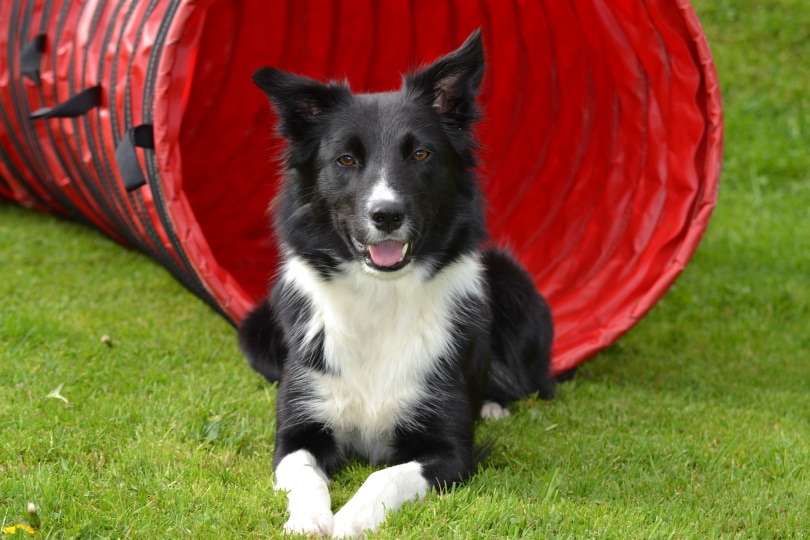
Training 🎾
Early socialization is extremely important for this breed. However, they are generally easy to train due to their devoted nature. They love anything that challenges their brain, including training. We recommend training these dogs regularly, as it helps them stay entertained and mentally stimulated. In fact, you should probably be worried about running out of things to teach your dog. You may have to get a bit creative and start teaching them “show tricks,” like jumping over your arm. Obedience and agility training are suitable options for this breed.
A large part of this dog’s training should involve socialization. You should start introducing them to a variety of situations, animals, and people as soon as possible. Puppy classes are highly recommended. Not only will the dog take to the obedience portion of the class, but the introduction to other people and dogs is also extremely helpful.
These dogs are naturally somewhat reserved with strangers, so socialization is important to ensure that they aren’t fearful.
Grooming ✂️
The Border Collie does not have significant grooming needs. There are two types of coat that this breed may potentially have: a rough coat and a smooth coat. The smooth coat is longer and feathered, while the rough coat is short and stiff. Despite these differences, all Border Collies need about the same level of grooming.
Brushing them with a pin brush a few days a week is recommended. However, during certain times of the year, you may need to brush them about three times a week. In fact, when the seasons change, daily brushing may be required. This will help remove much of the excess hair, making your dog more comfortable and preventing all the hair from ending up on your furniture.
Like all dogs, the Border Collie will require regular nail trimmings. You can plan on doing this every other month or so. If your dog’s nails are going “click, click, click” on hard floors when they walk, they need their nails trimmed. The Border Collie isn’t particularly prone to ear infections. However, you should still check their ears regularly to ensure that they aren’t getting infected. Dirty ears are more likely to get infected, so cleaning may be required if your dog gets particularly dirty.
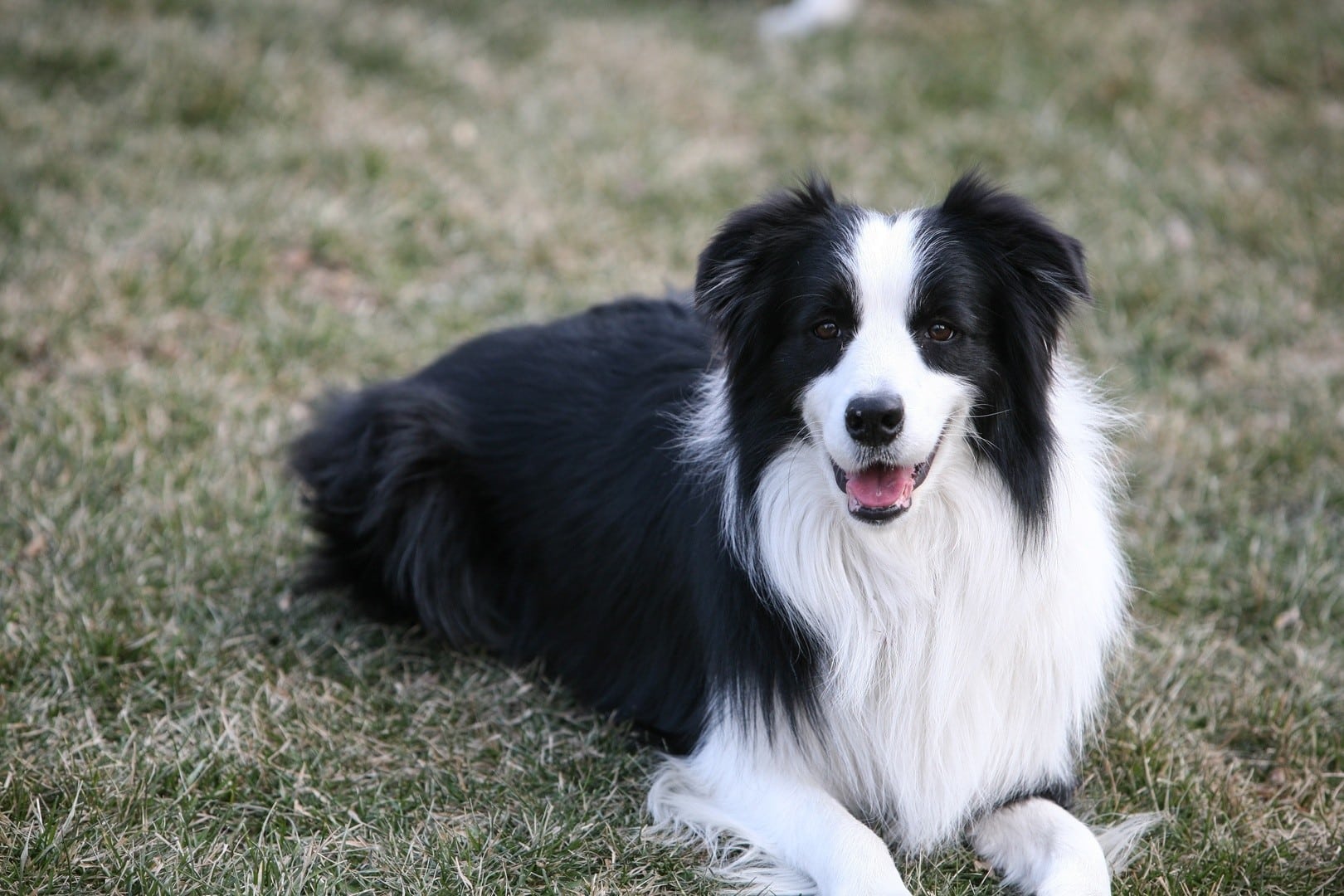
Health and Conditions 🏥
The Border Collie is generally a healthy breed. They are prone to two main genetic conditions: collie eye anomaly (CEA) and epilepsy. CEA is an inherited disorder that involves several parts of the eye. Usually, this disease is mild and doesn’t significantly cause changes in their vision. However, they may also be prone to progressive retinal atrophy, which can slowly disintegrate the dog’s vision until they become blind. Night blindness usually comes first with this disease, but full-day blindness does usually begin to develop at some point.
There are DNA tests for CEA. All Border Collies should receive this test to ensure that it isn’t passed onto their puppies. Be sure to ask any breeder whom you adopt from if their dogs are properly tested. Hip dysplasia testing is also available and important to ensure that the resulting puppies don’t end up with this painful disease.
Glaucoma is another somewhat common disease in these dogs. Recent studies have shown that these dogs have a genetic predisposition to this disease. There is no current test available for this one. Therefore, breeders have to go off of the presence of glaucoma in the family bloodline, which isn’t always accurate.
Neuronal ceroid lipofuscinosis is a rare disease, but it can be serious. It is mostly confined to show Border Collies and involves serious neurological impairment. Dogs affected usually do not survive past 2 years of age in most cases. A DNA test is available to detect affected dogs and carriers.
Border Collie collapse is a bit of an unusual disease. The exact cause isn’t known. This disease seems to mostly occur after intense exercise, which is common in these active dogs. However, some dogs may be able to run for miles without any problem, only to start showing symptoms after playing fetch. Symptoms include things like unsteady hind legs, disorientation, and needing to lay down. Usually, the dog doesn’t literally collapse, but they may not want to get up and move quite as much. There is no cure or treatment. Instead, the usual advice is to avoid activities that seem to cause an episode.
This issue actually occurs in a wide variety of different dog breeds, including the Labrador Retriever.
Male vs. Female
There are few differences between the sexes of this breed. Males seem to be a bit bigger, but not enough to make a substantial difference. Like all breeds, males may mark more, especially if they can smell a female that is in heat. Females will go into heat if they are not neutered.
3 Little-Known Facts About the Border Collie
1. They come in many different colors.
While the most popular Border Collie color is black and white, they can come in many different colors. You can find them in red, sable, and a variety of other combinations. Most of them have white markings on them, but this isn’t always the case.
2. Border Collies require a great deal of stimulation.
These canines are extremely intelligent, which means that they need plenty of mental stimulation to stay happy and healthy. Otherwise, they can become bored and destructive. One of the hardest things to do when owning a Border Collie is to keep them entertained and happy!
3. They will try to herd just about everything.
These dogs have serious herding instincts. They will attempt to herd just about anything, including cars and children. This often gets them into trouble, especially since you can’t train them not to herd. It’s in their blood. We don’t recommend them for families with small children, as their herding style can often be scary and involve nipping. You should never let them off-leash either, or they may run into the road and try to herd the cars!
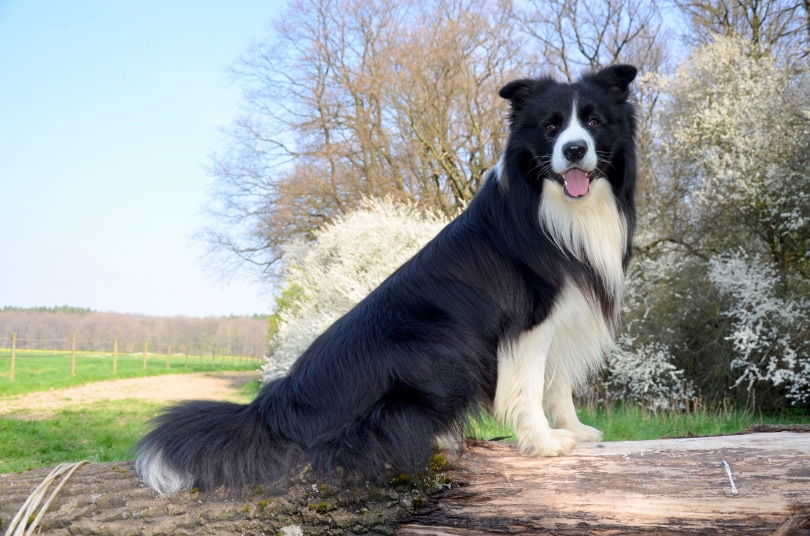
Final Thoughts
Border Collies are becoming increasingly popular as companion dogs. However, owners need to be fully aware of what they’re getting into before adopting one of these dogs. They are extremely intelligent. While this makes them easy to train, it also means that they need quite a bit of stimulation in order to thrive. Otherwise, they can become destructive and cause all sorts of problems. Furthermore, they also need a great deal of exercise. We only recommend them for active families for this reason; plan on spending hours a day exercising them.
Their herding instincts also create unusual problems. They will try to herd cars, for instance, which can lead to them getting into accidents. We recommend always keeping them on a leash, and they shouldn’t be allowed to roam. They may also herd children, small pets, and even smaller dogs. This can be a bit difficult to manage, especially if they are not socialized properly as puppies.
These intelligent dogs can make great companion animals, but their needs must be met. They are not a dog for families looking for a companion that will lay around much of the day.
Find out more about other popular dog breeds:
- Beagleman | Breed Info, Pictures & Complete Guide
- Short-Haired Border Collie: Care Guide, Pictures, Temperament & More
Featured Image Credit: BIGANDT.COM, Shutterstock








